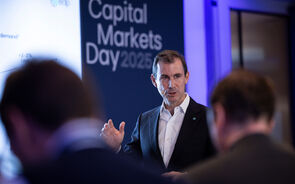Prophet of doom warns of blowout
1 Mensagem
|Página 1 de 1
Prophet of doom warns of blowout
*** Stochastics may now be flashing a sell signal on the market... the vix index and stochastics are showing a non confirmation... that is the vix is down at prior lows while the stochastics are not. This may be signaling a coming rise in the vix which could be signaling a coming decline in the market... how far and how deep she will go is anyones guess. -dvickers
The world's most prominent bear, Stephen Roach, comes to Australia at a time when he knows he is under pressure.
The chief economist of the world's biggest investment bank, Morgan Stanley, was the great bull of the 1990s. He picked the top of the market in March 2000 and since then has been correctly forecasting a difficult and dangerous time ahead.
But US shares have risen more than 20 per cent since mid-March and have led a global equities rally, which has extended to Japan.
Wall Street believes that the bear market is over and that we are into a new upward cycle.
Forecasters have to get it wrong from time to time and even Roach must know he is overdue for an error. But Roach does not think this is the time to change course. He believes, with a passion, that the markets are taking incredible risks without recognising them.
Roach believes that the world is passing through a series of asset bubbles which, he says, only "heighten the eventual perils of the post-bubble endgame".
"Since the 1990s, the policy response to each asset bubble has guaranteed that it has spread to the next asset class," he says. And so when the equity bubble exploded in 2000 the US central bank lowered interest rates to provide "extraordinary valuation support" for equities.
But that led to a US property bubble and when the US Federal Reserve cut rates even further to combat the multiple pitfalls of anaemic recovery and emerging deflation risks, a new bubble emerged – the bond market.
The bond bubble helped US consumer spending because US home loans are linked to the bond rate.
In the past few weeks, with the rally in equities, bond yields have risen from 3.1 per cent to 3.7 per cent, causing huge losses.
Wall Street believes that the equity game is now ready to start all over again and will be led by technology stocks.
Roach says consumers have become addicted to the extra purchasing power they can extract from overvalued assets. As a result, the debt burden of US households has risen sharply and, even with low interest rates, the debt service burden is well above the levels of the 1990s.
If the economy recovers and interest rates rise again (as the bond market is now predicting) then the debt problem would be enormous.
But there is equal risk of deflation emerging.
Roach says that as a result of the US government deficits and the tax cuts it is "not that far-fetched to envision the net savings rate falling from a record low of 1.3 per cent in the second half of 2002 to zero over the next 12 to 18 months".
"If that were to occur the current account deficit could widen further from its record 5.5 per cent of GDP in the March 2003 quarter to between 6.5 per cent and 7 per cent by the end of 2004," he wrote recently.
"Such a massive US current account deficit could well set the stage for the ultimate pyrotechnics of the post-bubble endgame – a full-blown (US) dollar crisis that would deal a very tough blow to the global economy and financial markets."
The Fed strategy is to buy time and hope for a "gradual and benign endgame".
"But I would assign equal odds to the possibility that there will be a more treacherous moment of reckoning. My concerns stem not only from the bubble-enduced debt overload but also from the increasingly ominous current account implications of a savings short US economy.
"The biggest difference from my bearish view of the world and the more sanguine views of others can be traced to the destructive power of the bubble. In my opinion the world is facing its toughest array of economic problems since the end of World War II.
"I never dreamt that I would live to see such profound challenges to core macro principles."
By: Robert Gottliebsen
The world's most prominent bear, Stephen Roach, comes to Australia at a time when he knows he is under pressure.
The chief economist of the world's biggest investment bank, Morgan Stanley, was the great bull of the 1990s. He picked the top of the market in March 2000 and since then has been correctly forecasting a difficult and dangerous time ahead.
But US shares have risen more than 20 per cent since mid-March and have led a global equities rally, which has extended to Japan.
Wall Street believes that the bear market is over and that we are into a new upward cycle.
Forecasters have to get it wrong from time to time and even Roach must know he is overdue for an error. But Roach does not think this is the time to change course. He believes, with a passion, that the markets are taking incredible risks without recognising them.
Roach believes that the world is passing through a series of asset bubbles which, he says, only "heighten the eventual perils of the post-bubble endgame".
"Since the 1990s, the policy response to each asset bubble has guaranteed that it has spread to the next asset class," he says. And so when the equity bubble exploded in 2000 the US central bank lowered interest rates to provide "extraordinary valuation support" for equities.
But that led to a US property bubble and when the US Federal Reserve cut rates even further to combat the multiple pitfalls of anaemic recovery and emerging deflation risks, a new bubble emerged – the bond market.
The bond bubble helped US consumer spending because US home loans are linked to the bond rate.
In the past few weeks, with the rally in equities, bond yields have risen from 3.1 per cent to 3.7 per cent, causing huge losses.
Wall Street believes that the equity game is now ready to start all over again and will be led by technology stocks.
Roach says consumers have become addicted to the extra purchasing power they can extract from overvalued assets. As a result, the debt burden of US households has risen sharply and, even with low interest rates, the debt service burden is well above the levels of the 1990s.
If the economy recovers and interest rates rise again (as the bond market is now predicting) then the debt problem would be enormous.
But there is equal risk of deflation emerging.
Roach says that as a result of the US government deficits and the tax cuts it is "not that far-fetched to envision the net savings rate falling from a record low of 1.3 per cent in the second half of 2002 to zero over the next 12 to 18 months".
"If that were to occur the current account deficit could widen further from its record 5.5 per cent of GDP in the March 2003 quarter to between 6.5 per cent and 7 per cent by the end of 2004," he wrote recently.
"Such a massive US current account deficit could well set the stage for the ultimate pyrotechnics of the post-bubble endgame – a full-blown (US) dollar crisis that would deal a very tough blow to the global economy and financial markets."
The Fed strategy is to buy time and hope for a "gradual and benign endgame".
"But I would assign equal odds to the possibility that there will be a more treacherous moment of reckoning. My concerns stem not only from the bubble-enduced debt overload but also from the increasingly ominous current account implications of a savings short US economy.
"The biggest difference from my bearish view of the world and the more sanguine views of others can be traced to the destructive power of the bubble. In my opinion the world is facing its toughest array of economic problems since the end of World War II.
"I never dreamt that I would live to see such profound challenges to core macro principles."
By: Robert Gottliebsen
Surfer
1 Mensagem
|Página 1 de 1


